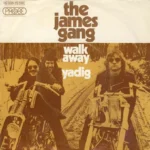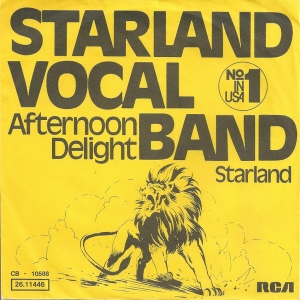 Rock and roll history is filled with songs that perfectly balance swagger, musicianship, and soul — tracks that make you nod your head, tap your foot, and feel just a little bit cooler for listening to them. The James Gang’s 1971 classic “Walk Away” is one of those songs. It’s the sound of a tight power trio firing on all cylinders, and at its center is a young Joe Walsh — part guitar hero, part mad scientist — combining raw riffing, rhythmic brilliance, and a voice that practically drips personality. “Walk Away” is the moment where the James Gang’s blues-rock foundation collided with Walsh’s quirky genius, resulting in one of the most perfectly crafted rock singles of the early ’70s.
Rock and roll history is filled with songs that perfectly balance swagger, musicianship, and soul — tracks that make you nod your head, tap your foot, and feel just a little bit cooler for listening to them. The James Gang’s 1971 classic “Walk Away” is one of those songs. It’s the sound of a tight power trio firing on all cylinders, and at its center is a young Joe Walsh — part guitar hero, part mad scientist — combining raw riffing, rhythmic brilliance, and a voice that practically drips personality. “Walk Away” is the moment where the James Gang’s blues-rock foundation collided with Walsh’s quirky genius, resulting in one of the most perfectly crafted rock singles of the early ’70s.
To understand why “Walk Away” still packs such a punch, you have to put yourself in that era’s musical landscape. The late ’60s and early ’70s were a time when the power trio format — made famous by Cream, The Jimi Hendrix Experience, and ZZ Top — ruled the rock stage. Bands were pushing amplifiers and musicianship to the limit, creating sounds that were raw yet sophisticated. Out of Cleveland, Ohio, the James Gang had built a reputation as a working-class band with bite, and by the time “Walk Away” appeared on their third album Thirds in 1971, they had mastered the art of economy. Three musicians. One groove. Infinite cool.
The song opens with that unmistakable riff — one of the most underrated in rock. It’s a tight, funky guitar line that alternates between rhythm and lead, something Walsh was a master at. There’s no fat on it. Every note has purpose. The rhythm section of Dale Peters on bass and Jim Fox on drums locks in immediately, giving the song a muscular backbone that’s as much funk as it is rock. Within seconds, you’re caught in its momentum. It’s not showy. It’s not bombastic. It just moves.
Walsh’s vocal performance deserves just as much attention as his guitar work. He delivers the lyrics with that unmistakable mix of sly charm and melancholy resignation. “Takin’ my time, choosin’ my lines / Tryin’ to decide what to do…” he sings, his voice easy and conversational, yet full of character. The song isn’t a breakup anthem in the traditional sense — it’s more of a knowing shrug at the messiness of love and human behavior. The narrator is weary, self-aware, and honest. There’s no bitterness, just recognition that sometimes, you’ve got to cut loose and keep walking. It’s an emotional tone Walsh would revisit throughout his career — the cool detachment of “Life’s Been Good” or the wistful humor of “A Life of Illusion” all have roots here.
One of the most brilliant things about “Walk Away” is how seamlessly it combines blues-rock grit with a funky rhythmic pulse. The verses are lean and propulsive, but the chorus blooms into something big and open. “Seems to me / You don’t want to talk about it…” — that line, sung with a little edge, opens into one of rock’s most satisfying refrains. It’s catchy without being poppy, anthemic without being overblown. Walsh knew exactly how to use space, letting the instruments breathe and the groove do the heavy lifting.
The guitar solo, naturally, is where “Walk Away” becomes transcendent. Walsh doesn’t shred for the sake of showing off; he tells a story with his playing. His phrasing is impeccable — part Clapton, part Beck, part something uniquely his own. There’s that biting tone, achieved through his mastery of the talk box and later perfected in his solo work. The solo dances between melody and chaos, precision and abandon. It’s the kind of playing that influenced an entire generation of guitarists, from Joe Perry to Tom Morello, who understood that expression matters more than speed.
For a band often remembered as a precursor to Walsh’s later fame with the Eagles, “Walk Away” is proof that the James Gang stood tall on their own. This wasn’t some side project or bar-band curiosity — this was a real, hard-hitting rock outfit. The trio format meant there was nowhere to hide, and yet every element here feels perfectly balanced. Peters’ bass isn’t content to just hold the low end; he’s melodic and playful, weaving counterlines around Walsh’s guitar. Fox’s drumming is loose but authoritative — listen to the subtle ghost notes on the snare or the way he uses cymbal accents to punctuate the groove. It’s deceptively simple, but that’s what makes it timeless.
Lyrically, “Walk Away” sits in that sweet spot between frustration and liberation. It’s not a song about heartbreak so much as about knowing when to quit while you’re ahead. The tone is mature — there’s no teenage angst here, just the wisdom of experience. “Better be movin’ on,” Walsh concludes, and you can almost hear the grin behind it. It’s that effortless cool — the idea that walking away doesn’t have to mean losing. Sometimes, it’s just the smarter play.
What makes “Walk Away” endure, more than fifty years after its release, is how alive it still sounds. Put it on today, and it doesn’t feel dated or trapped in its era. That’s because it wasn’t chasing trends — it was carving out its own space. The production is warm and organic, built on live energy rather than studio trickery. It’s one of those rare songs where every instrument sounds exactly where it should be: the guitar front and center, the bass and drums locked tight, and Walsh’s vocals floating above it all.
Over the years, “Walk Away” has become something of a secret handshake among classic rock fans. It never dominated radio the way the Eagles’ hits did, nor did it become a staple of karaoke nights. Instead, it occupies that perfect cult status — the song that true rock aficionados know and cherish. When Joe Walsh re-recorded it for his 1976 solo album You Can’t Argue with a Sick Mind, it was a nod to its staying power. Even among his later hits, the song still stands out as a definitive statement of who he was as a musician — witty, soulful, and just slightly eccentric.
It’s worth noting that “Walk Away” also captures a transitional moment in rock music. The early ’70s were seeing the end of the psychedelic era and the beginning of something leaner, meaner, and more direct. The James Gang were part of that evolution — less about trippy experimentation and more about precision and punch. You can hear echoes of their style in later bands like Grand Funk Railroad, Bad Company, and even early Aerosmith. They were making music that was both grounded and adventurous, accessible but still rooted in musicianship.
Joe Walsh’s influence from this era can’t be overstated. Before he became a household name as a member of the Eagles, he was already regarded as one of rock’s most distinctive guitar voices. His ability to fuse technical skill with humor and heart made him a rare figure in the scene. “Walk Away” is the best showcase of that balance. You can sense that playful intelligence — the way he toys with rhythm, bends notes in unexpected ways, or slips a sly vocal inflection into a line. It’s rock music with personality, something you can’t manufacture.
Beyond its technical and emotional appeal, “Walk Away” also captures a mood — a kind of early-’70s cool that feels both laid-back and self-assured. It’s the soundtrack to someone leaning against a jukebox, beer in hand, knowing exactly who they are. That confidence, that sense of ease, is something only the greats can pull off. You hear it in Walsh’s delivery, in the groove’s unhurried flow, in the way the song ends not with a bang but with a perfectly timed fade-out. It doesn’t need to overstate itself — it knows it’s great.
The song’s influence also shows up in the way it blurred genre lines. “Walk Away” isn’t pure blues, nor is it straightforward rock. It flirts with funk, soul, and even a touch of country in its phrasing. That hybrid quality would later become Walsh’s trademark, and it’s a big reason why the James Gang feels so modern in retrospect. They weren’t afraid to groove. They weren’t afraid to sound good.
Listening to “Walk Away” today, you can’t help but feel that it represents something rare in rock music — a perfect moment of balance. It’s sophisticated without being pretentious, catchy without being shallow, and technical without losing its humanity. It’s one of those songs that sounds effortless because every piece of it was crafted with care.
By the time the James Gang disbanded and Walsh went on to join the Eagles, “Walk Away” had already secured its place in rock’s DNA. It’s the kind of song that musicians love to play and fans love to rediscover. Whether you’re hearing it for the first time or the hundredth, it never fails to hit that sweet spot between nostalgia and immediacy.
More than five decades later, “Walk Away” remains one of Joe Walsh’s finest moments — a reminder that great rock doesn’t need flash or bombast. All it takes is groove, grit, and honesty. And when you’ve got those three things, sometimes the smartest move really is to just walk away.


